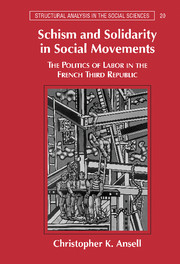Book contents
- Frontmatter
- Contents
- Acknowledgments
- 1 The Struggle and the Conciliation
- 2 Schism and Solidarity
- 3 Vox Pouli, Vox Dei
- 4 Esprit de Corps
- 5 Organizing the Fourth Estate
- 6 The New Covenant
- 7 “Above All We Are Syndicalists”
- 8 From Congregation to Reformed Church
- 9 Dealignment
- 10 The Party the Syndicalists Built
- 11 Conclusion
- Works Cited
- Index
3 - Vox Pouli, Vox Dei
Published online by Cambridge University Press: 21 July 2009
- Frontmatter
- Contents
- Acknowledgments
- 1 The Struggle and the Conciliation
- 2 Schism and Solidarity
- 3 Vox Pouli, Vox Dei
- 4 Esprit de Corps
- 5 Organizing the Fourth Estate
- 6 The New Covenant
- 7 “Above All We Are Syndicalists”
- 8 From Congregation to Reformed Church
- 9 Dealignment
- 10 The Party the Syndicalists Built
- 11 Conclusion
- Works Cited
- Index
Summary
Le peuple is the true successor to Christ, the sole worldly representative of God. Vox populi, vox Dei.
Félix PyatAmong Protestant peoples, the more vigorously the Established Church is assailed by dissident sects the greater the moral fervour developed. We thus see that conviction is founded on the competition of communions, each of which regards itself as the army of truth fighting the armies of evil.
Georges SorelChapter 3 argues that to understand the development of the French labor movement during the Third Republic, it is necessary to place the movement in a populist tradition. Peter Wiles defines populism as “any creed or movement based on the following major premise: virtue resides in the simple people, who are the overwhelming majority, and in their collective traditions” (Ionescu and Gellner 1969, 166). Or, as James Q. Wilson nicely puts it in describing the worldview of the American populist:
The people were fundamentally good and their intuitions could be trusted if they were freed from institutional constraints and the blandishments of self-seeking leaders. Political organization generally, and political parties specifically, were at best necessary evils which should be shackled. Populism represented distrust of organization and a commitment to direct democracy. The problem to be solved was not simply bad organization but over-organization (Wilson 1966, 26).
- Type
- Chapter
- Information
- Schism and Solidarity in Social MovementsThe Politics of Labor in the French Third Republic, pp. 37 - 57Publisher: Cambridge University PressPrint publication year: 2001

